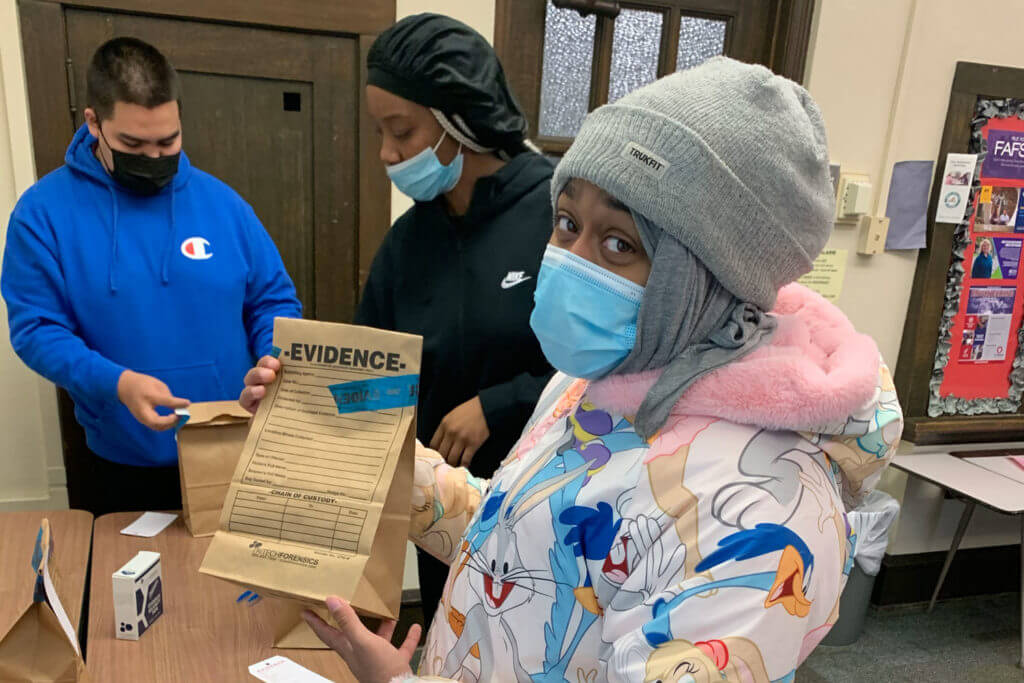At Roosevelt Community Education Center, Law and Public Safety pathway students in the Introduction to Criminal Investigations course are debating the Fourth Amendment. “This is important guys,” says teacher Michael “Mike” Dalke. “Even if you aren’t going to be a cop, you need to understand your rights because it could apply to you as soon as you walk out of this door, if you’re stopped in a traffic stop, if you have an encounter with a police officer.”
Mike should know. While he shows up each school day ready to greet his students, teaching is not his full-time job. A 24-year veteran of the Rockford Police Department, Mike is better known as Assistant Deputy Chief. “My colleagues keep wondering where I’m going every day at 8:30 a.m., but I’ve got to get to my class.”
So, what is class like with an active-duty deputy police chief? Expect timely, passionate, and informative discussions to start. “One of the things I’ll talk about in class is community inclusion. We have discussions about current events and learn the principles of procedural justice and community policing. I think it’s very important that students understand this framework at an early stage in their career preparation, that it is ingrained in them that the public are the police, and the police are the public,” says Mike.
Then there are the hands-on opportunities that not every teacher would normally have access to. “I have a student interested in working in forensics, so it was very easy for me to call the coroner up and say, ‘Hey, Bill, I need to come down today; let’s record a tour for my kids.’ Or, I’ve just gone downstairs to the CSI unit and let them talk virtually with actual investigators. While it’s been all virtual tours this year, we’re looking forward to doing in-person experiences again, hopefully very soon. We’ll get students in the force simulator, for example, which always starts great conversations.”
After serving as the police department’s lead for community engagement, Mike knew the importance of working with students and was ready to answer the call when Reid Jutras, Director of Career and Technical Education at Rockford Public Schools, invited him to join the team of instructors at Roosevelt. “Over the years, I’ve helped to lead a variety of community initiatives, such as our basketball camps and art fairs. Teaching feels like an extension of those duties,” says Mike.
The Law and Public Safety Pathway Backstory
With support from Alignment Rockford, Rockford Public Schools launched the Law and Public Safety pathway in 2010 with the rollout of the high school academy model. The pathway, one of the first initiatives to offer students dual credit courses, resulted from a community-wide effort to strategically recruit and train residents for public service careers. “At the police department, we had started seeing recruits coming in from the suburbs, and we would dedicate time and money to send them to the police academy. But then, when they had their certification, they would leave the department and return to their hometown. So together with the mayor’s office, we started to look at how we could better prepare people in the city of Rockford for these opportunities,” says Mike. “Even if all the students don’t eventually join the police or fire departments, our hope is that taking these classes will help them see their local police in a different light.”
In 2018–19, Alignment Rockford’s Criminal Justice Commission, which both Reid and Mike participate in, reformatted the pathway sequence to align to a 2+2 guided transfer program with Rock Valley College and Rockford University. “Our goal is to offer the opportunity for our students who are interested in a career in law or public service to earn some college credit while still in high school, and then hopefully segue into the 2+2 guide transfer program,” says Reid. Just this past year, Rockford University added a new criminal justice degree program as part of the program. Mike, who has a master’s degree in curriculum, is now working with Rock Valley College to update their course offerings and ensure full alignment across the secondary and postsecondary partners.
The 2+2 program also benefits from the broader alignment efforts made this past year by Rockford Public Schools and Rock Valley College, with assistance from EdSystems. Strategic changes at Rock Valley College, such as moving Transitional Reading from a prerequisite to a corequisite course for dual credit and moving to a multiple measures admissions policy, allows more equitable access to the dual credit courses in the Law and Public Safety pathway.
To further enhance the pathway, Rockford Public Schools expanded it to all five of Rockford’s high schools and began hiring active and retired police officers from the area to oversee and teach the Law and Public Safety courses. “Our students are now learning from the actual experiences of people who have done the job. We feel that’s really important, that if you’re going to learn the trade, then you should learn from the boots on the ground,” says Reid.
As a result, the pathway is seeing exponential growth in terms of student interest. “We have students interested in law enforcement, fire, law, the military; it’s a broad spectrum. Our kids are genuinely interested in the information and, frankly, the personalities of the instructors because they bring that real lens to the job,” says Reid.
The Future
To expand criminal justice career exploration opportunities to even more students, Mike and Reid are developing plans for an extracurricular program incorporating law enforcement training and practical experience, including volunteering at community events, security, and traffic control. The program would promote personal growth through character development, physical fitness, and citizenship.
Mike is already planning to teach more classes at Rockford Public Schools after he retires. “I really look forward to working more with the school district and Rock Valley College, to make the students’ experience with criminal justice the best it could possibly be.”
“When I told the kids that I don’t get paid to do this,” Mike shares, “all their heads raised up from their desks. I told them, ‘I volunteer because I love you all. I want to make you better people. That’s why I’m here.’ They kind of laughed it off, but that’s the truth.”
With Thanks to CFNIL
The support Rockford Public Schools receives from EdSystems, thanks to the Community Foundation of Northern Illinois, is helping to drive aligned college and career pathways forward, including the Law and Public Safety pathway. “Specifically, the support we receive is helping to get the right people at the table, to have the needed discussions that might not have happened otherwise,” explains Reid. “For dual credit courses which are electives and not part of the core curriculum, such as the criminal justice courses, it would be easy to keep putting off conversations about how we can make this work for our students. With your support, we’re able to reach agreements and expand opportunities for our students.”
“The city believes in this program, and it’s making a difference. Recently, I had a huge ask: I wanted a retired squad car, and the city found a way to give us that. It made a huge difference this year, as it’s one of the few things students could do hands-on during socially distant learning. They were able to do traffic stop scenarios and other simulations outdoors in our parking lot. It’s been a bigger opportunity for our students than I expected,” says Reid.



